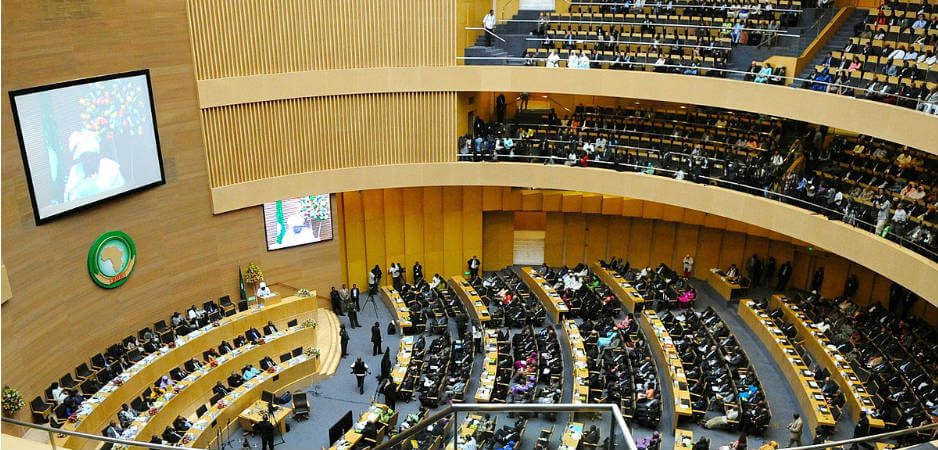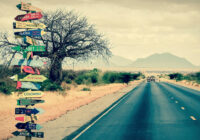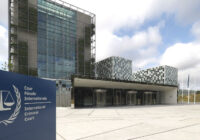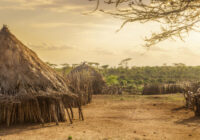In spite of strife and humanitarian challenges, Africa is rising in global stature and beginning to bring its Big Men to justice.
Africa was once deemed the Dark Continent. Even today, Africans and those of African origin face racism, discrimination and danger not only in the US and Europe, but also in China and India. Thankfully, the most recent incidents of racism against Africans in Europe, China and India have led to widespread outrage in these timeworn societies. Even a far-right German anti-immigration party apologized for its leader’s remarks on Jérôme Boateng, a German soccer player and son of an African father. Perhaps, as Bob Dylan once sang, “the times they are a-changin’.”
Two Big Developments on Africa Day
On May 25, 1963, the Organization of African Unity was formed and, over time, it evolved into the African Union (AU). Just as European leaders came together after World War II to end “the frequent and bloody wars” that plagued Europe for centuries, newly independent African states united “to achieve a better life for the peoples of Africa.”
It is for this reason that May 25 has been christened “Africa Day” and is commemorated every year. This month, Africa Day was marked by two significant events.
First, South Korean President Park Geun-hye became the first Korean leader to address the AU. She spoke of combining “Africa’s abundant and human resources” with “South Korea’s technology and capital” to create new synergies and boost Africa’s development.
Park paid the de rigueur tribute to Nelson Mandela and pointed out that Korea shared Africa’s colonial experience. She reminded her audience that barely half a century ago, “Korea remained plagued by starvation and despair.” She promised to be a partner for Africa and pursue a “plan for two-way exchanges of 10,000 youths” that would create jobs. Under this plan, 6,000 Africans will get educated in South Korea whilst 4,000 Koreans will volunteer in Africa. Even though the numbers are not tremendously high, this people-to-people exchange promises to be significant.
Aside from the big boys—the US and China—other countries are also taking more of an interest in Africa. A greater engagement with the wider world along with educational opportunities elsewhere is what this young and ambitious continent of over a billion needs. Park’s promise of setting up technology innovation centers marks a new step for a continent that has so far largely been a source of raw materials for the rest of the world.
Most significantly, Park paid tribute to Africa for experiencing the process of crafting an agreement on the “African Nuclear-Weapon-Free Zone” and sought African help on nuclear North Korea. Now, the extent of Africa’s potential influence in this regard is debatable. Even US President Barack Obama finds it exasperating to deal with North Korea’s “erratic” and “irresponsible” leader. China’s influence on North Korea, a country it feeds and fuels through energy supplies, is limited as well. So, the AU cannot achieve what the US and China have failed to. What is important here is that the leader of a richer part of the world living under the shadow of nuclear devastation is giving the AU long overdue credit for abjuring nuclear weapons and limiting possibilities of destruction like Hiroshima or Nagasaki.
Second, the AU took a historic step on Africa Day in India. Africans in India have long experienced discrimination. More than seven decades after independence, Indians retain deference for white folks whilst looking down on those with more melanin in their skin. Stories of discrimination are rife and Africans have catalogued the everyday racism that blights their lives. Africans are regularly called “blacky” and often fear for their safety. Men are seen as criminals and drug peddlers. Women are seen as loose and sex workers.
In a nutshell, life for most Africans in India is nasty and brutish. Sometimes, it can be short as well. Recently, a Congolese student was beaten to death in New Delhi, India’s national capital. Sushma Swaraj, India’s unedifying foreign minister, incongruously claimed that the death was not a case of a racist attack. Attacks against Africans are well-chronicled and a mob attack in 2014 attracted much attention. Some Indians say this attack was a response to African men misbehaving with Indian women. That is most likely bunkum. Indians tend to pick on Africans because of the color of their skin.
India’s flailing state fails to protect the vulnerable. Africans are no exception. What irks them is the constant denial on the part of Indian leaders like Swaraj that they face a problem. On Africa Day, the African Group of Heads of Mission declared that it would not join Indian celebrations out of solidarity with the dead Congolese student. This is a slap in the face of the Indian government, which has been courting Africa lately. In October 2015, it hosted a summit for African leaders and even critics of the Indian government deemed it to be a success. Yet Indian authorities have failed to acknowledge, leave aside address, the daily discrimination Africans face in the country.
The boycott was not the only weapon African diplomats used to pierce the armor of apathy and negligence on the part of the Indian government. They went on to declare: “Given the pervading climate of fear and insecurity in Delhi, the African Heads of Mission are left with little option than to consider recommending to their governments not to send new students to India, unless and until their safety can be guaranteed.”
India wants big power status and a seat in the United Nations Security Council. For that it needs African support. On Africa Day, African diplomats have finally recognized their clout and have set a terrific precedent by holding a rising regional power to account.
Justice Finally as a “Big Man” Goes to Jail
Hissène Habré, once the “Big Man” of Chad, was sentenced in Senegal “to life imprisonment for crimes against humanity, torture and sex crimes.” The Guardian called Habré’s conviction “a watershed for human rights justice in Africa and beyond.” It sets a new precedent because it is the first time a former African dictator was tried and convicted of international crimes, in a different African state, under that country’s laws.
Once, Habré ruled Chad with an iron fist from 1982 to 1990. The country, also known as the “Dead Heart of Africa,” lies south of Libya and west of Sudan. In the good old days of the Cold War, the Central Intelligence Agency (CIA) deemed it as a critical battleground against the Soviets. Indeed, it was the boys from Langley who assisted Habré’s ascent to the throne. Habré beat back Muammar Gaddafi’s troops to repay the CIA’s faith in him. Generous American and French assistance helped. Ronald Reagan, who embraced the South African apartheid regime, infamously declared: “Chad’s accomplishment is admired by the free world and will benefit all of Africa.”
Like other dictators propped up during the Cold War, Habré was a brutal thug. His henchmen killed an estimated 40,000 people, tortured thousands and raped hundreds. When Idriss Déby overthrew Habré, the CIA helped Habré resettle in Senegal where he lived in the lap of luxury.
Africans in India have long experienced discrimination. More than seven decades after independence, Indians retain deference for white folks whilst looking down on those with more melanin in their skin.
Sadly for Habré, the world changed after the Cold War. The US under Barack Obama is charting a very different course. Cold War dictators can no longer be whitewashed as champions of freedom and are seen as the tyrants they truly were. General Augusto Pinochet of Chile was arrested in London on a warrant from a Spanish judge for crimes committed against his people. Universal jurisdiction, the idea of the culmination of the universality of human rights and international justice, has boldly stepped off the theory pages and has been gathering operational steam. In fact, it was Pinochet’s arrest that inspired the Chadian Association for Human Rights to contact Human Rights Watch (HRW) to bring Habré to justice, earning him the moniker, “the African Pinochet.”
Habré’s trial and conviction occurred because the United Nations’ International Court of Justice (ICJ) ordered Senegal “to prosecute and try him” or extradite him to Belgium. Revivified by Pinochet’s tribulations, three Belgian citizens of Chadian origin filed a case against Habré in November 2000. Belgian authorities investigated and then indicted Habré in 2005. It was only after torturous negotiations and convoluted legal proceedings that Habré was eventually tried.
Habré’s conviction will strike fear into the hearts of other African dictators. Salil Shetty, the secretary-general of Amnesty International, has declared: “Safe havens are no longer safe for those suspected of committing war crimes, crimes against humanity or other crimes under international law.” This is not entirely true. Idriss Déby, the man who overthrew Habré in 1990, continues to rule Chad. Africa continues to have other Big Men such as Uganda’s Yoweri Museveni and Zimbabwe’s Robert Mugabe. Yet they have now been put on notice that they may not get away with impunity for all their atrocities. Once they lose power, Big Men can now end up in jail.
The Rwanda Burundi Story Continues
Rwanda and Burundi have acquired infamy for ethnic conflict and genocide of the 1990s. Since then, both countries have reached some sort of stability under authoritarian rulers. Rwanda is ruled by Paul Kagame, Museveni’s former intelligence chief. In the words of Nii Akuetteh, Kagame “is one of America’s friendly tyrants” and, as per the BBC, is a man schooled in conflict who is no Nelson Mandela. Burundi’s big boss is Pierre Nkurunziza. Like other Big Men, he wants to stay on in power and has won a third term in office, which some say contravenes the constitution. Many are not too pleased with this idea and Burundi has been experiencing violence since April 2015.
Kagame is Tutsi and Nkurunziza is Hutu. Tribal rivalries that had been shoved under the carpet are now making a comeback. Nkurunziza has been trying to take away the powers of Burundi’s Tutsi minority, which is pushing back. In both countries, Hutus form a majority. In the continuing violence, Amnesty International has uncovered “possible mass graves” of victims of Burundian security forces. Kagame has intervened as he did in Congo to protect Tutsi interests. After all, the professorial Kagame runs a government where almost all key personnel share his ethnic roots. Kagame has a reputation for being authoritarian. In two well written stories, Newsweek and Politico describe how Kagame’s opponents mysteriously drop dead.
The rivalry between Nkurunziza and Kagame has led to strife in Burundi. In March, Nkurunziza accused Kagame of seeking to export genocide to Burundi. Unsurprisingly, many are fleeing. As per Tanzania’s Daily News, more than 260,000 people, over half of whom are children, have fled Burundi. Nearly 140,000 have fled to Tanzania alone. Thousands have fled to Rwanda too. Kagame is hitting back. This month, Rwanda has expelled more than 1,500 Burundians and the situation is reaching a tipping point.
Humanitarian Challenges
Even as refugees continue to stream out of Burundi, Africa faces even bigger humanitarian challenges. According to the International Organization for Migration (IOM), “Displacement due to the Boko Haram insurgency has now reached almost three million” in the Lake Chad Basin that comprises Nigeria, Niger, Cameroon and Chad. Speaking at the World Humanitarian Summit in Istanbul, Stephen O’Brien, the under-secretary-general for Humanitarian Affairs and Emergency Relief Coordinator (ERC) at the United Nations (UN), declared West Africa’s Lake Chad Basin to be the world’s most neglected humanitarian crisis.
A senior Red Cross official estimates the gap between the suffering and the humanitarian response to be bigger than in Syria, Iraq or Yemen. In 2015, the UN raised barely 40% of the $535 million that it sought for the region. Boko Haram’s carnage has disrupted trade and agriculture. Drought, joblessness and extreme poverty have done the rest.
Last year, the UN pointed out that Lake Chad Basin had become an epicenter of “violence and terror” where children as young as 6 years old were becoming suicide bombers. At the time, O’Brien called it “the scene of the fastest-growing displacement crisis in Africa.” Things have got worse since. Clearly, increasing awareness and providing relief are the two big challenges facing policymakers in the region and richer parts of the world.
Even as numbers of refugees rise, Kenya has announced that Dadaab, the world’s largest refugee camp, will close in November. Dadaab was set up in 1991 and houses more than 300,000 Somali refugees. Some people have been living there for over 20 years. Kenya’s reason for closing Dadaab is security. It claims that terrorists plan attacks against Kenya in Dadaab. Therefore, it will spend $10 million to repatriate refugees humanely.
Unrecognized by much of the world, Kenya has one of the largest refugee populations in the world. This resource-strapped country hosts half a million refugees. Now, Kenya seems to have reached the limits of its hospitality. It has shut down the Department of Refugee Affairs. The same populism that Donald Trump is unleashing in the US is infecting Kenyan politics. People want to take care of their own instead of funding refugees from other tribes and other religions.
What happens to these people who have fled dangerous areas and are often at great risk of hunger, disease and violence remains the big unanswered question.
The views expressed in this article are the author’s own and do not necessarily reflect Fair Observer’s editorial policy.
Photo Credit: US Department of State
 We bring you perspectives from around the world. Help us to inform and educate. Your donation is tax-deductible. Join over 400 people to become a donor or you could choose to be a sponsor.
We bring you perspectives from around the world. Help us to inform and educate. Your donation is tax-deductible. Join over 400 people to become a donor or you could choose to be a sponsor.
Support Fair Observer
We rely on your support for our independence, diversity and quality.
For more than 10 years, Fair Observer has been free, fair and independent. No billionaire owns us, no advertisers control us. We are a reader-supported nonprofit. Unlike many other publications, we keep our content free for readers regardless of where they live or whether they can afford to pay. We have no paywalls and no ads.
In the post-truth era of fake news, echo chambers and filter bubbles, we publish a plurality of perspectives from around the world. Anyone can publish with us, but everyone goes through a rigorous editorial process. So, you get fact-checked, well-reasoned content instead of noise.
We publish 2,500+ voices from 90+ countries. We also conduct education and training programs
on subjects ranging from digital media and journalism to writing and critical thinking. This
doesn’t come cheap. Servers, editors, trainers and web developers cost
money.
Please consider supporting us on a regular basis as a recurring donor or a
sustaining member.
Will you support FO’s journalism?
We rely on your support for our independence, diversity and quality.






